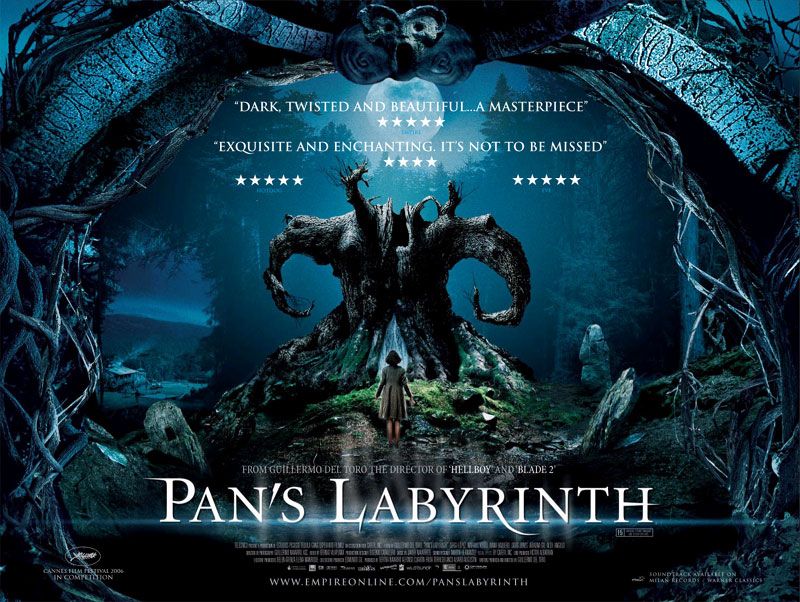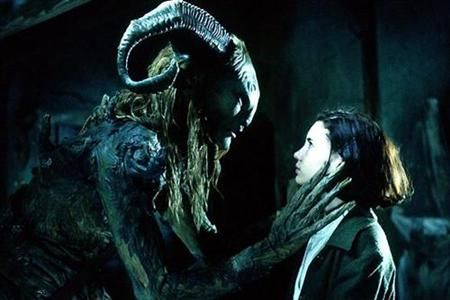I’m really not sure where to begin with this. If I were still doing IT CAME FROM NETFLIX! I may just lead with a few moments of silence. Powerful films have a way of taking the breath, the very words right out of me. Make no mistake: Pan’s Labyrinth is one of those films.

The year is 1944, and Spain is under new management by the fascist Francisco Franco. At a forward post established against guerrillas fighting the new regime, Captain Vidal has summoned his wife and step-daughter to stay with him. His wife, Carmen, is close to giving birth to his son, while the girl, Ofelia, would rather keep her nose in her fairy tale books. En route to the post, Ofelia happens across a strange insect that transforms before her eyes and leads her to a secluded labyrinth where a faun tells her she may be a legendary princess. To prove herself worthy of her birthright, she must accomplish a series of tasks, in the midst of this bloody civil war, with the lives of all she knows and holds dear hanging in the balance.
Writer-director Guillermo del Toro is no stranger to dark fantasy. He brought us Blade II (one of the good ones) and both Hellboy films. By ‘dark’, I don’t mean the sort of dark fantasy where there’s lots of naked women and cursing and gratuitous buckets of blood. No, I mean thematically dark. Truly dark. The sort of dark that has kids curling up tight in their beds with their sheets pulled up to just under their eyes, because they’re scared witless by what’s in the shadows but don’t dare look away. You could even call it ‘edgy’, as it lives on the very edge between fantasy and horror. Pan’s Labyrinth is unafraid to glance, just for a moment here and a heartbeat there, into the deep shadows of the realms of the unknown and the very real darkness in human nature.

Absolutely stunning visuals.
You can’t tell a story like this without good characters, and in film you need good actors to make them come alive. In the hands of a less adept director, Captain Vidal would come across as a caricature of the fascist movement, a Nazi in all but name, not so much a man as he is a punching bag leering at us to hit him harder. Thankfully, the character is written with complexity and depth, even if he’s a rather vile human being, and Sergi López gives a fantastic performance. As for Ofelia, del Toro was so impressed by Ivana Baquero that he aged up her part so the young actress could play it. She, too, is complex and deep, as well as fallible.
Here are two human beings who come at life from entirely different angles, even in some cases wanting the same thing for completely disparate reasons, and their conviction is what drives this story forward and holds us mesmerized by it. The visuals and the construction of del Toro’s fantasy world don’t hurt, either. Culled from all sorts of fairy and folk tales, the world Ofelia alone can see, touch, and enter is brought to breathtaking life, with del Toro mainstay Doug Jones playing the parts of the Faun and the Pale Man. As wondrous as it is, there’s also a primal and untamed nature to it, as as attractive as it might be to a young girl, one wonders if it’s any less dangerous than the cold, jackbooted reality through which her stepfather reigns as nominal master.

My skin crawls just looking at the guy.
The tendency is to write something like “I can’t say enough about this” but I really feel, in this case, I can’t say any more about it. You should really just watch it, if you haven’t already. Despite its fairy tale trappings, it’s an exceedingly mature and heart-wrenchingly vital tale, far removed from what most would consider kid-friendly. Don’t be put off by the choice del Toro made to shoot it in Spanish; the truths of this film and the lives of its characters transcend things like spoken language. It is one of the most deeply affecting films I’ve seen in a very long time. I really cannot recommend Pan’s Labyrinth highly enough.



Leave a Reply